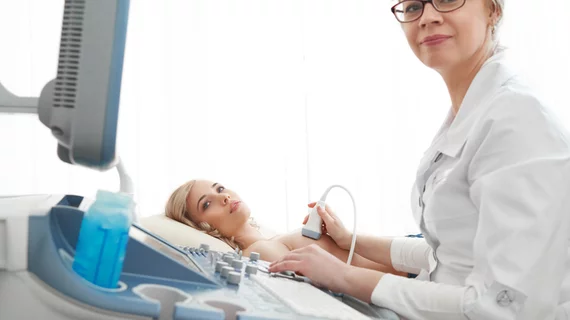AI tool increases radiologists’ accuracy at spotting breast cancer on ultrasound scans by 37%
An artificial intelligence tool is helping increase radiologists’ ability to correctly spot breast cancer on ultrasound by 37% while also dropping the number of biopsies and false positives.
Experts from hospital giant NYU Langone Health tested the system on nearly 45,000 previously completed exams, sharing their work Friday in Nature Communications. Ultrasound has proven useful at assessing women with the disease and is also cheaper and more readily than mammography. However, it is prone to false positives that can lead to patient anxiety and additional unnecessary services.
Researchers hope AI can alleviate these concerns while broadening access.
“If our efforts to use machine learning as a triaging tool for ultrasound studies prove successful, ultrasound could become a more effective tool in breast cancer screening, especially as an alternative to mammography, and for those with dense breast tissue," study co-investigator and radiologist Linda Moy, MD, a professor at NYU’s Grossman School of Medicine, said in a statement. “Its future impact on improving women's breast health could be profound.”
Moy and colleagues used data from nearly 290,000 exams of 143,000-plus patients imaged at the New York City institution between 2012-2019 to develop the program. It’s able to pinpoint cancer cases by assigning a probability of malignancy and labeling breast scans with the area tied to its determination. Those involved tested the tool by comparing its findings to those of 10 board-certified radiologists. AI notched higher accuracy, but a hybrid model with both rads and artificial intelligence proved most successful, increasing average accuracy from 92% to 96%. Along with improving professionals’ ability to spot cancer, researchers also recorded a 27% drop in unnecessary biopsies.
Scientists said further studies are needed to confirm the system’s efficacy in the real world. But they see a promising future for artificial intelligence-aided ultrasound in breast cancer screening.
“AI is not a replacement for the expertise of clinicians. However, the powerful, complimentary role that AI systems can play as a decision support tool leads us to believe that they should and will be increasingly translated into clinical practice,” study co-author and NYU Abu Dhabi Assistant Professor of Computer Engineering Farah Shamout, PhD, said in a statement.

